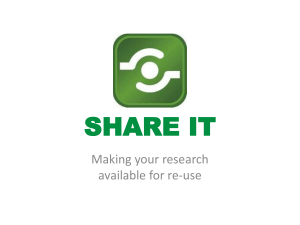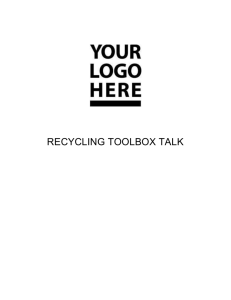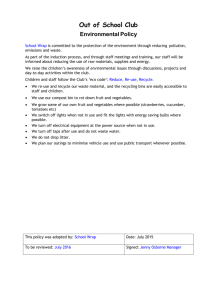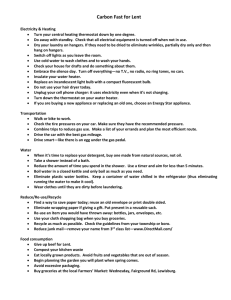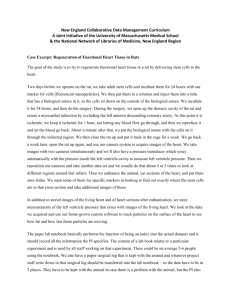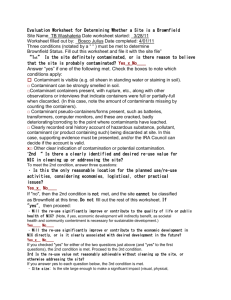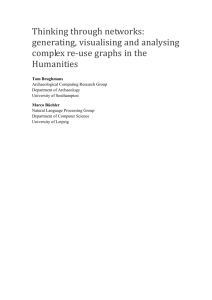Guidance on statements of public task
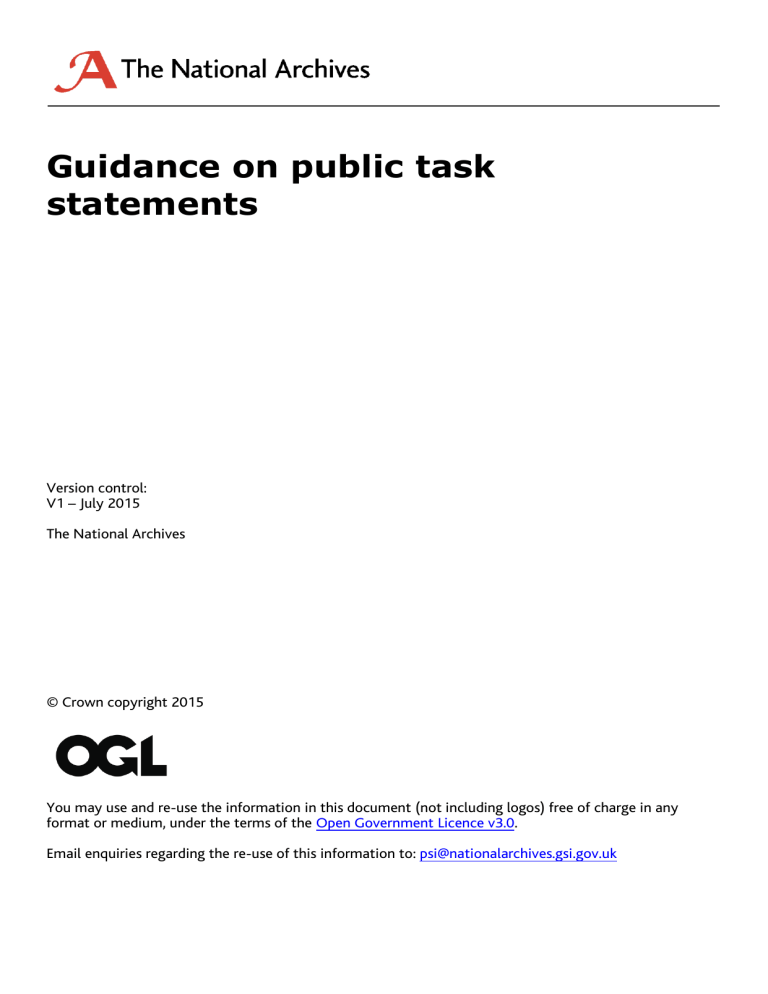
Guidance on public task statements
Version control:
V1 – July 2015
The National Archives
© Crown copyright 2015
You may use and re-use the information in this document (not including logos) free of charge in any format or medium, under the terms of the Open Government Licence v3.0
.
Email enquiries regarding the re-use of this information to: psi@nationalarchives.gsi.gov.uk
Contents
Guidance on statements of public task – July 2015 Page 2
Introduction
This Guidance on creating statements of public task is for all public sector bodies in scope of the Re-use of Public Sector Information Regulations 2015 (the ‘2015 Regulations’). It will help you:
understand what the term public task means
define your public task
create a public statement of public task
publish a transparent statement.
Defining your public task will help you understand what information you produce, hold or disseminate is in scope of the 2015 Regulations.
Your statement of public task will help you to meet government and public expectations of transparency and accountability, and to promote the re-use of your public sector information.
What is ‘public task’?
Public task relates to your core role and functions. Your core role and functions may be statutory or established through custom and practice. There are no definitive statements on what is meant by the term in the 2015 Regulations.
What information falls within my public task?
Any information you produce, hold, collect or disseminate to fulfil your core role and functions is within your public task. This information is a key component of your statement of public task. Generally, information produced as part of your public task:
is essential to your public service
is produced as part of a statutory requirement
is produced by established custom and practice
enjoys authoritative status by virtue of being issued by you as a public sector body
you are the only source for the information
its creation and maintenance is funded through taxation rather than revenues or private investment.
Your statement may also include tasks where the information that you produce, hold or disseminate is not part of your public task, if that will make the definition of your public task clearer. This might be the case where there are two public sector bodies that carry out complementary or related functions, such as NHS trusts and other health authorities.
Why you need to create a statement of public task
Your statement of public task will help to make clear what information you produce, hold or disseminate falls within the scope of the 2015 Regulations. Other important benefits include:
quickly determining if a request to re-use public sector information is in scope of the
2015 Regulations and its provisions (e.g., on fairness, charging and complaints)
Guidance on statements of public task – July 2015 Page 3
providing clearer distinction between activities that fall within a public sector body’s core responsibilities and those of a more optional (and often commercial) nature
affecting how you use and re-use your own information and the terms of that re-use. If you use information for one of your own public task activities, that is not re-use. If you re-use your own public task information for activities outside your public task, you must do so on the same terms and conditions as other re-users for the same type of re-use
(e.g., commercial)
informing re-users what information is available for re-use. Permitting re-use is mandatory for most public sector information (unless it is otherwise restricted or excluded)
clarifying what licence terms should be applied to information being made available for re-use (e.g., the Open Government Licence, non-commercial or other licence)
demonstrating your transparency and accountability
advising re-users if a complaint about re-use can be made under the 2015 Regulations.
Who has to create a statement of public task?
Public sector bodies should have a statement of public task:
if their information is not readily re-usable under the Open Government Licence or another open licence
if one or more of the following occur: o they have received a request for re-use of their information under the 2015
Regulations o they are considering charging for re-use of their information o they have received a complaint under the 2015 Regulations.
Regulation 5(1)(a) sets out that the Regulations do not apply to documents falling outside the public task of the public sector body, but only provided that the scope of the public task is transparent and subject to review. This means that if any public sector body seeks to refuse requests for re-use on the grounds that the requested document sits outside of its public task, it MUST have a transparent (e.g., published) statement setting out the scope of that public task, and that statement MUST be subject to review.
Crown bodies that charge for their information, or want to restrict the re-use of their information MUST have a statement of public task – this is a requirement for the body to have authority to licence Crown copyright material. These bodies include information traders, bodies that are members of the Information Fair Trader Scheme (IFTS) and bodies with a delegation of authority.
Non-Crown bodies seeking to join the IFTS will also be required to have a statement of public task.
Even if these conditions do not apply to you, it is best practice to develop and publish a transparent public task statement.
Guidance on statements of public task – July 2015 Page 4
Life cycle of a statement of public task
Develop statement based on core role and functions
Sign off by Minister or responsible
Accounting Officer
Decide level of detail required
Take account of views of stakeholders and any reuse challenges
Publish statement
Review of statement of public task – either periodic or when triggered by a re-use challenge
Link public task statement to information assets list
Guidance on statements of public task – July 2015 Page 5
Creating a statement of public task
Public task principles
1.
Clarify your functions in relation to information you produce, collect, hold and disseminate
The statement’s primary purpose is to help potential re-users understand whether your information falls within the scope of the 2015 Regulations and is potentially re-usable, as well as to satisfy the specific requirement in Regulation 5(1)(a).
Any information you produce, collect, hold or disseminate to fulfil your core role and functions is within your public task. Your core role and functions may be statutory or established through custom and practice.
2.
Be open to challenge
Re-users of your information (or an independent body representing them) will be free to challenge your statement of public task and its scope. You should publish your public task and your complaints process up front, in particular on your website.
You will need to take proper account of legitimate challenges and concerns. Re-users must be able to access your internal complaints process if they are not satisfied with the way you have dealt with their challenge or complaint. If the re-user is still not satisfied, then they may escalate it to the Information Commissioner’s Office and potentially to the Information Rights
Tribunal.
3.
Be current
You should regularly review your public task statement to ensure that it remains up-to-date and reflects any new or changed responsibilities or functions (for example after a machinery of government change). You should consult stakeholders and re-users on proposed changes to statements and enable them to challenge changes.
4.
Be written in Plain English
Avoid legalese and jargon. You should set out your public task information clearly and concisely.
Guidance on statements of public task – July 2015 Page 6
Creating a short statement of public task
If you produce, hold or disseminate only minimal information, a short statement of public task may be appropriate. If you wish to charge for information or join the IFTS you will need to have a more detailed statement.
Typically, a short public task statement should refer to legislation governing your core activities and published statements of your aims, functions and responsibilities. These might be found in:
legislation (statutes, orders and regulations)
annual reports
statements of aims and purposes on official websites
official directories or works of reference where these set out functions generally undertaken by local or regional bodies or bodies
directories or lists of functions carried out by local or subsidiary bodies published by a central co-ordinating or oversight body, such as the list of duties required of local authorities.
Consider the following when creating a basic statement of public task:
If you share information with another public sector body as part of either your or the other body’s public task, include this in your statement. Sharing information with another public sector body for a public task activity of either body is not re-use.
Include activities where you produce, collect, hold, use or disseminate public sector information.
A statement of public task must be open to challenge, and challenges must be properly considered. You can select the method of enabling such challenges, for example by providing online consultation with specific contact information, or by referring challenges to an appropriate stakeholder representative body or other mechanism.
Guidance on statements of public task – July 2015 Page 7
Sample short statement
Statement of public task by Anyplace NHS Trust
This statement sets out the functions carried out by Anyplace NHS Trust that are within our public task under the Re-use of Public Sector Information Regulations 2015 (the
‘2015 Regulations’).
We operate under the terms of [refer to any statutes, orders and regulations under which you have functions or responsibilities].
Our public task comprises all the functions, duties and responsibilities set out in the statement of purpose [add link] published on our website, together with any statutory responsibilities laid down for NHS Trusts generally that apply to this Trust.
Our public task information is available for free re-use under the Open Government
Licence [add link].
This statement is regularly reviewed and is due to be considered again in [month and year].
If you have any queries on this public task statement, you can submit them using the contact us [add link] form. If you have a complaint about the Trust under the 2015
Regulations, you can submit it using our general complaints [add link] handling process.
[month and year statement created or last updated]
Guidance on statements of public task – July 2015 Page 8
Creating a detailed statement of public task
Public task criteria
The following criteria will help you decide whether information is within your public task:
it is essential to the public service for which you are responsible
it explains your policy
it sets out how the law must be complied with
citizens consider it to be key to their relationship with you
you have a statutory requirement to produce, collect, hold or disseminate it
it is established custom and practice that you produce, collect, hold or disseminate it
it enjoys authoritative status by virtue of being issued by you
you are the only source for it
its creation and maintenance is funded through taxation rather than revenues or private investment.
You should analyse your information assets and apply these criteria to decide which of your assets fall within your public task.
The National Archives recommends restricting this analysis only to information assets that are already available or can be made available for re-use.
In the case of sensitive personal information, remember that some personal information can be aggregated and anonymised as part of your public task, and therefore could be made available for re-use.
Remember for clarity you may also want to describe what activities you engage in and information you produce, collect, hold or disseminate that are not within your public task.
Explaining the criteria
It is essential to the public service for which you are responsible
If you cannot meet your public service goals and objectives if the information was not produced, collected, held or disseminated, then it is within your public task. For example, you may have a statutory obligation to compile a register of certain information, which you keep in database form available on your website.
It explains your policy
All the various types of documents you regularly publish which explain your business and core activities are information within your public task. These include annual reports (which may also be required by statute), mission and value statements, business plans, your planned work, consultation papers, and so forth.
It sets out how the law must be complied with
An example of this type of public task information is guidance on the Building Regulations maintained by the Department for Communities and Local Government (DCLG). Anyone wanting to construct or commission a building covered by the Building Regulations has to comply with the guidance, which is produced as part of the Department’s public task.
Guidance on statements of public task – July 2015 Page 9
Citizens consider the information to be key to their relationship with you
This is likely to include information about the services you provide, and information concerned with governance and accountability, for example, your spending patterns. It might also include any hazard warnings for which you are responsible for alerting the public, or similar public duties.
There is a statutory requirement to produce, collect, hold or disseminate the information
When you have a legal obligation to produce, collect, hold or disseminate the information, it is within your public task. You should identify every statutory requirement relating to your core functions.
It is established custom or practice that you produce, collect, hold or disseminate the information
Information you produce, collect, hold or disseminate through established custom and practice, where there is no statutory requirement to do so, is within your public task.
It enjoys authoritative status by virtue of being issued by you
Information which gains special status due to its being issued by you as a public sector body is within your public task. This includes situations where a regulator or other public sector body provides additional guidance to assist other organisations in meeting their obligations.
You are the only source for the information
If you are the sole holder of information (often by statute), it is within your public task. For example, where you have the authority or power to compel the provision of certain information or there is a requirement to register certain information with you, then that information is clearly within your public task.
Its creation and maintenance is funded through taxation
Most information that a public sector body produces, holds or disseminates is funded with public funds.
An example of information falling outside your public task would be privately commissioned research on information you hold as part of your public task. The commissioned research may involve applying your expertise to source information, which may or may not be openly available for public re-use, in order to produce additional analysis. The commissioned work in this case is funded by outside revenues and is outside your public task even though you assisted and it is based on your information.
Guidance on statements of public task – July 2015 Page 10
Sample detailed statement – basic
If you have one discrete function that produces information being made available for re-use, you may be able to create a statement of public task that deals with that one set of information. This might be the case where particular work is carried out under a memorandum of understanding or a contract, or by some other formal arrangement on behalf of the government or another authority.
Anyplace Development Authority statement of public task
This statement sets out the functions carried out by Anyplace Development Authority that are within our public task under the Re-use of Public Sector Information
Regulations 2015 (the ‘2015 Regulations’).
We operate under the terms of [refer to any statutes, orders and regulations under which you have functions or responsibilities].
It is Anypl ace Development Authority’s public task to promote and encourage the economic and social development of Anyplace under the powers set out in the
Anyplace Development Act and according to the Anyplace Council’s published Town
Development Plan. Other development activities in the region but outside the scope of the plan are connected to the Authority’s commercial estate management activities and are outside the Authority’s public task.
All information held as part of the Authority’s public task is available for re-use under the 2015 Regulations. The Authority will also consider any requests to re-use information falling outside our public task. See our licensing page [add link] for applicable terms and conditions.
This statement is regularly reviewed and is due to be considered again in [month and year].
If you have any queries on this public task statement you can submit them using the contact us [add link] form. If you have a complaint about the Authority under the 2015
Regulations, you can submit it using our general complaints [add link] handling process.
[month and year statement created or last updated]
Guidance on statements of public task – July 2015 Page 11
Sample detailed statement – custom and practice
If you are a public sector body with a long history of varied activities that have changed repeatedly over time, you may find yourself responsible for carrying out activities for which you have no direct statutory remit but which you have traditionally carried out.
Any Department of State’s statement of public task
The public task of this Department of State under the Re-use of Public Sector
Information Regulations 2015 (the ‘2015 Regulations’) consists in those information activities for which it is responsible under primary legislation in the United Kingdom and in England and Wales, along with relevant secondary legislation, orders and statutory instruments. A full list of the statutes, orders and regulations under which this
Department of State has functions and responsibilities can be found in the About Us
[add link] section of the Department’s website.
The Department’s public task also includes some customary practices for which we are responsible but for which there is no specific statutory or regulatory provision, which include:
List of any customary practice responsibilities
This statement is regularly reviewed and is due to be considered again in [month and year].
If you have any queries on this public task statement you can submit them using the contact us [add link] form. If you have a complaint about the Department under the
2015 Regulations, you can submit it using our general complaints [add link] handling process.
[month and year statement created or last updated]
Guidance on statements of public task – July 2015 Page 12
Sample detailed statement – mixed commercial and non-commercial
If your information is developed or held for the purpose of making profit, that is commercial reuse.
An example is the Safety Climate Tool developed by the Health and Safety Laboratory building on its existing public task activities. Those activities remain in the public task, but providing and selling the Safety Climate Tool are outside that task.
Anyplace Laboratory statement of public task
This statement sets out the functions carried out by Anyplace Laboratory that are within our public task under the Re-use of Public Sector Information Regulations
2015.
We operate under the terms of [refer to any statutes, orders and regulations under which you have functions or responsibilities].
The public task of the Anyplace Laboratory comprises that part of its work carried out under memorandum of agreement on a non-commercial basis for public sector bodies and international organisations.
Other work we carry out under contract for commercial private sector firms, charities and other organisations paying for the hire of the Laboratory’s accumulated staff expertise and information is outside our public task. Information relating to products derived from public task activities for re-sale in the commercial market are outside our public task. Therefore the following information products are outside our public task:
List of products
This statement is regularly reviewed and is due to be considered again in [month and year].
If you have any queries on this public task statement you can submit them using the contact us [add link] form. If you have a complaint about the Laboratory under the 2015 Regulations, you can submit it using our general complaints [add link] handling process.
[month and year statement created or last updated]
Guidance on statements of public task – July 2015 Page 13
Sample detailed statement – cultural sector: libraries (including university libraries), museums and archives
For cultural public sector bodies who build, curate and preserve a collection of published, unpublished, physical and digital information.
Everybody’s Library/Museum/Archives
This statement sets out the functions carried out by Everybody’s
Library/Museum/Archive that are within our public task under the Re-use of Public
Sector Information Regulations 2015
(the ‘2015 Regulations’).
We operate under the terms of [refer to any statutes, orders and regulations under which you have functions or responsibilities]. This includes our:
Content/acquisition strategy
Accessibility and digital strategy
Public engagement
We also consider part of our public task our work carried out at the direction of our
[name of external management board, authority, including local authority if applicable, etc.], for example:
List any examples
The Library/Museum/Archive holds and uses documents for the following purposes within its public task:
List of documents such as those related to the collection, the physical operation of the Library/Museum/Archive, access and acquisition, etc.
Other work we carry out under contract (e.g., for research purposes) through organisations paying for the hire of the Library /Museum/Archive’s accumulated staff expertise and information is outside our public task. Information relating to products derived from public task activities for re-sale in the commercial market are outside our public task. Therefore the following information products are outside our public task:
List of products
This statement is regularly reviewed and is due to be considered again in [month and year].
If you have any queries on this public task statement you can submit them using the contact us [add link] form. If you have a complaint about the
Library/Museum/Archive under the 2015 Regulations, you can submit it using our general complaints [add link] handling process.
[month and year statement created or last updated]
Guidance on statements of public task – July 2015 Page 14
Review of your statement of public task
The team responsible for creating/updating the statement may want to obtain legal review for reassurance that it appropriately covers your core responsibilities and functions.
After obtaining any legal advice, you may wish to discuss the statement with The
National Archives for assurance on the extent to which it conforms to the public task principles.
The responsible team should then secure internal sign-off from your Board,
Accounting Officer, shareholders or other appropriate authority.
Once signed off, you should make the statement available for public scrutiny or comment and challenge. You might post the statement on your website and invite comment, or submit it as a formal paper to any oversight body that includes representatives of your customers and/or stakeholders.
Remember that one of the public task principles is that it should be open to challenge. Anyone may challenge the statement at any time and you must take account of and respond appropriately to such challenges.
As a result of these steps, it may be necessary to revise your statement before publication.
Publication
Make your statement of public task available online, with links to web pages with licensing terms and conditions, charges, lists of information available for re-use, any IFTS members’ statements of commitment, and any other relevant content.
Ideally you should link the statement from your homepage (as you may do with ‘about us’ and
‘contact’ links) to promote clarity for re-use of your information.
After publication
You should keep your statement of public task up-to-date in accordance with your review schedule, or to reflect any changes to your core functions and responsibilities. Changes might occur following new legislation or machinery of government changes.
The National Archives is the policy lead for the Information Fair Trader Scheme (IFTS) . As part of the verification process we review and make recommendations on the public task statements prepared by accredited full members of the IFTS. The statements will be assessed against the public task principles, and any recommendations for improvements will be published in the verification report.
Guidance on statements of public task – July 2015 Page 15
Resources
From The National Archives:
Public Task
Re-using Public Sector Information (PSI)
UK Government Licensing Framework
Open Government Licence
Regulatory:
The Re-use of Public Sector Information Regulations 2015
Directive 2013/37/EU of the European Parliament and of the Council of 26 June 2013 amending Directive 2003/98/EC on the re-use of public sector information
Prior Regulations: Re-use of Public Sector Information Regulations 2005
Prior Directive: Directive 2003/98/EC on the re-use of public sector information
Guidance on statements of public task – July 2015 Page 16
